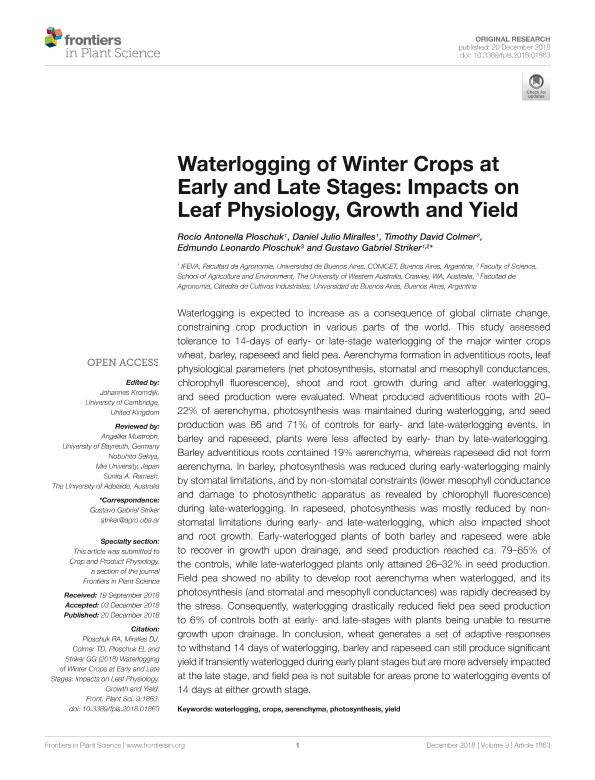Artículo
Waterlogging of winter crops at early and late stages: Impacts on leaf physiology, growth and yield
Ploschuk, Rocio Antonella ; Miralles, Daniel Julio
; Miralles, Daniel Julio ; Colmer, Timothy David; Ploschuk, Edmundo Leonardo; Striker, Gustavo Gabriel
; Colmer, Timothy David; Ploschuk, Edmundo Leonardo; Striker, Gustavo Gabriel
 ; Miralles, Daniel Julio
; Miralles, Daniel Julio ; Colmer, Timothy David; Ploschuk, Edmundo Leonardo; Striker, Gustavo Gabriel
; Colmer, Timothy David; Ploschuk, Edmundo Leonardo; Striker, Gustavo Gabriel
Fecha de publicación:
01/2019
Editorial:
Frontiers Media
Revista:
Frontiers in Plant Science
ISSN:
1664-462X
Idioma:
Inglés
Tipo de recurso:
Artículo publicado
Clasificación temática:
Resumen
Waterlogging is expected to increase as a consequence of global climate change, constraining crop production in various parts of the world. This study assessed tolerance to 14-days of early- or late-stage waterlogging of the major winter crops wheat, barley, rapeseed and field pea. Aerenchyma formation in adventitious roots, leaf physiological parameters (net photosynthesis, stomatal and mesophyll conductances, chlorophyll fluorescence), shoot and root growth during and after waterlogging, and seed production were evaluated. Wheat produced adventitious roots with 20–22% of aerenchyma, photosynthesis was maintained during waterlogging, and seed production was 86 and 71% of controls for early- and late-waterlogging events. In barley and rapeseed, plants were less affected by early- than by late-waterlogging. Barley adventitious roots contained 19% aerenchyma, whereas rapeseed did not form aerenchyma. In barley, photosynthesis was reduced during early-waterlogging mainly by stomatal limitations, and by non-stomatal constraints (lower mesophyll conductance and damage to photosynthetic apparatus as revealed by chlorophyll fluorescence) during late-waterlogging. In rapeseed, photosynthesis was mostly reduced by non-stomatal limitations during early- and late-waterlogging, which also impacted shoot and root growth. Early-waterlogged plants of both barley and rapeseed were able to recover in growth upon drainage, and seed production reached ca. 79–85% of the controls, while late-waterlogged plants only attained 26–32% in seed production. Field pea showed no ability to develop root aerenchyma when waterlogged, and its photosynthesis (and stomatal and mesophyll conductances) was rapidly decreased by the stress. Consequently, waterlogging drastically reduced field pea seed production to 6% of controls both at early- and late-stages with plants being unable to resume growth upon drainage. In conclusion, wheat generates a set of adaptive responses to withstand 14 days of waterlogging, barley and rapeseed can still produce significant yield if transiently waterlogged during early plant stages but are more adversely impacted at the late stage, and field pea is not suitable for areas prone to waterlogging events of 14 days at either growth stage.
Palabras clave:
AERENCHYMA
,
CROPS
,
PHOTOSYNTHESIS
,
WATERLOGGING
,
YIELD
Archivos asociados
Licencia
Identificadores
Colecciones
Articulos(IFEVA)
Articulos de INST.D/INV.FISIOLOGICAS Y ECO.VINCULADAS A L/AGRIC
Articulos de INST.D/INV.FISIOLOGICAS Y ECO.VINCULADAS A L/AGRIC
Citación
Ploschuk, Rocio Antonella; Miralles, Daniel Julio; Colmer, Timothy David; Ploschuk, Edmundo Leonardo; Striker, Gustavo Gabriel; Waterlogging of winter crops at early and late stages: Impacts on leaf physiology, growth and yield; Frontiers Media; Frontiers in Plant Science; 871; 1-2019; 1863-1877
Compartir
Altmétricas



